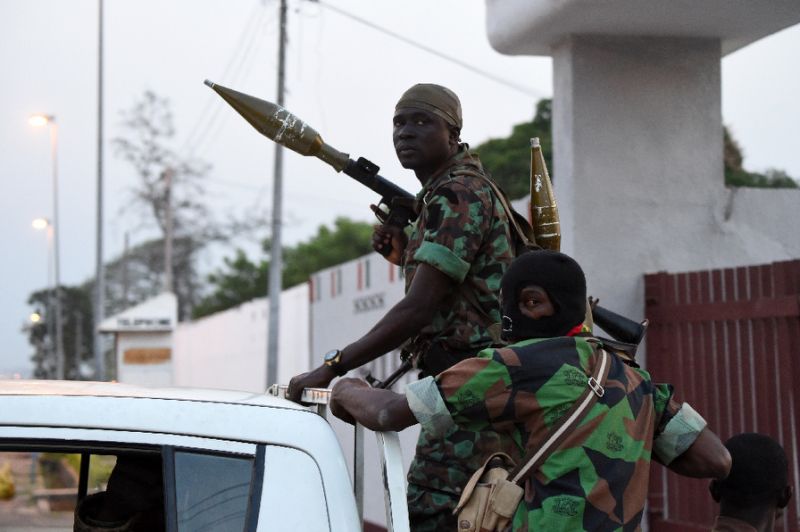Protests by some disgruntled Ivory Coast soldiers broke out in the commercial capital Abidjan on Friday hours after they began in the country’s second largest city over a demand for bonuses.
Gunfire had erupted in several locations in the Ivory Coast as anger spread following a decision by some leaders of a group of mutineers to drop demands for bonuses.
The protests by soldiers, most of them ex-rebel fighters who helped bring President Alassane Ouattara to power, began in the second largest city, Bouake, overnight before spreading to Abidjan and the northern town of Odienne.
The unrest came a day after a spokesman for thousands of soldiers who participated in a January mutiny, which paralyzed parts of the world’s top cocoa grower, said the group would forego demands for more money.
“That’s not what they were meant to say,” said one of the mutiny leaders in Bouake, who asked not to be named, explaining the reaction of the soldiers to the announcement.
“Soldiers are at the entrances to the city. We won’t close it off for the moment … Other soldiers are also deployed inside the city.”
He said if they received no response from the authorities, they would seal off access to Bouake in the evening.
Mirroring the rapid spread of the January mutinies, gunfire also was heard at Ivory Coast’s military headquarters as well its largest military base in Abidjan, military and diplomatic sources said. Soldiers also blocked access to the northern city of Odienne, a resident said.
On Thursday, some 8,400 soldiers who mutinied in January apologized to Ouattara in an orchestrated ceremony that was aired on national television.
Organized without the knowledge of the press, the event — broadcast after it took place at the presidential palace — signaled a dramatic end to the protest movement.
As well as apologizing, the rebels said they were giving up all their financial demands.
Ouattara said of the rebels that he “believed their words were sincere” and they would now be “exemplary soldiers”.
A spokesman for the rebels, named as Sergeant Fofana said: “We apologize for the various situations we know we have caused. We definitively renounce all our financial demands.”
At the start of January, former rebels integrated into army ranks staged a mutiny that paralyzed activity in several towns of the west African country while they pressed for bonuses.
In meeting the demands of the ex-rebels, who controlled the northern half of Africa’s biggest cocoa producer between 2002 and 2011, the authorities provoked a fresh mutiny by other troops and paramilitary gendarmes.
Clashes claimed four lives in the political capital Yamoussoukro.
The mutineers, who demanded 12 million CFA francs (18,000 euros) in payments for each soldier, obtained 5 million francs (7,500 euros) in January and had been due to receive the rest of the sum this month, the rebels had told AFP.
Ouattara said Thursday the country was going through a “very, very difficult time” after a fall in the price of cocoa led to “a net loss of 150 billion francs CFA (230 million euros)” to the state budget.
He also announced that the government had given up plans to build new schools, a health center and cultural centers across the country, as well as the delay to 2018 of a key election promise — bringing electricity to every village with more than 500 inhabitants.
Last year, Ivory Coast launched an ambitious plan for the modernization of the military, including an overhaul of personnel as well as purchases of materiel worth 1.2 billion euros.
Part of the plan provides for the departure of several thousand men, particularly ex-rebels, who will not be replaced.
Ivory Coast has emerged from a 2002-2011 conflict as one of the world’s fastest-growing economies. But deep divisions persist, particularly in a military assembled from ex-rebel and loyalist fighters, raising the specter of lingering instability.
